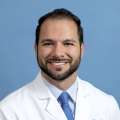Endoscopic Sleeve Gastroplasty
Find your care
Our expert interventional endoscopy team includes skilled physicians who perform minimally invasive endoscopic procedures to treat GI disorders. Call 310-267-3636 to connect with a specialist.
Lifestyle and medical therapy alone unfortunately do not achieve sustained-long term weight loss in a large number of patients. Among available surgical techniques, laparoscopic sleeve gastrectomy (LSG aka surgical sleeve) and Roux-en-Y gastric bypass surgery have been proven to be safe, highly effective procedures, but there is a wide gap between the number of patients with obesity and those who undergo surgical treatment. The American Society for Metabolic and Bariatric Surgery estimates that only approximately 1% of all patients who qualify for surgery actually undergo surgery. There are also many patients who may not qualify for bariatric surgery, for example, due to not meeting body mass index (BMI) requirements. Finally, some patients may opt to avoid traditional surgery.
What is endoscopic sleeve gastroplasty (ESG)?
ESG is an additional option for those patients who do not qualify for or want traditional bariatric surgery. The procedure involves insertion of an endoscope through the mouth (under anesthesia) using a suturing device to recreate the anatomy of a surgical LSG. In an LSG, the stomach is stapled vertically so that a small 'tube' is left behind and the majority of the stomach is removed from the flow of ingested food. This creates restriction, reducing that amount of food you can eat, and also alters satiety-inducing hormones.
ESG uses the suturing device to create the tube or sleeve internally without removing any part of the stomach. This technique allows for an 'incisionless operation,' with a low rate of complications, lower cost, and faster recovery times compared with the surgical approach.
ESG procedure: What to expect
- Requires overnight fast prior to surgery but no bowel preparation
- Typically, a one to two-hour outpatient procedure with an extended recovery to treat pain or nausea
- Minimal risks, such as those associated with any endoscopic procedure
- Proven efficacy
- Requires highly restricted diet for one month following surgery along with continued lifestyle modification (diet and exercise)
Before and after the procedure
To give you the best chance of successful weight loss, we recommend a consultation with our multidisciplinary team before the procedure. This team may include a dietitian, bariatric surgeon, medical weight loss specialist, and other experts from the Center for Obesity & Metabolic Health (COMET) or the Center for Human Nutrition. During this consultation, you’ll learn about the diet and lifestyle changes needed after the procedure to avoid complications, support your weight loss, and help you maintain it long term. After the procedure, a follow-up appointment with your endoscopist will be scheduled about one month later to monitor your progress and provide ongoing support.
How much weight can I expect to lose with ESG?
A review of multiple studies including > 1800 patients who underwent ESG demonstrated that patients achieved a ~15% loss of total weight and ~60% loss of excess weight at one year. There was a very low rate of complications with a favorable safety profile compared to laparoscopic sleeve gastrectomy (LSG). ESG may also help patients achieve improvements in other weight-related health issues, such as obstructive sleep apnea, type II diabetes, and high blood pressure. Other studies have reported up to 17-20% weight loss, on average, after the ESG. These numbers can be exceeded in highly motivated patients, especially in combination with other weight loss programs and/or medications.
Frequently asked questions about endoscopic sleeve gastroplasty
- How much weight will I lose?
- Most studies show average weight loss between 15-20% of total weight, (and potentially more depending on individual anatomy and motivation).
- Will I need to follow a specific diet following surgery?
- Yes. Patients should adhere to a restricted diet, similar to the diet followed after a traditional bariatric surgery. This typically consists of 2-3 weeks of liquid diet then soft foods thereafter. Your physician will review this with you during your consultation visit and you will be provided detailed recovery diet instructions to follow after the procedure. Our weight loss experts can guide you during this recovery as well as for your long-term diet changes.
- When can I return to work?
- Most patients can return to work after a few days. Many patients report near complete symptom recovery within 3-7 days.
Will my health insurance cover this procedure?
We can try to submit the procedure for insurance approval, as some insurances do provide coverage for the ESG. However, many still do not. UCLA will provide an estimate of out-of-pocket costs for the procedure, appointments with the endoscopists, and nutrition team visits.
Learn how Emma achieved her weight loss goals
Until she was 40, Emma Ridley Carter performed and taught dance and ate a healthy diet. She was just over 5-foot-2, and apart from her three pregnancies, weighed about 110 pounds for most of her adult life. After retiring, she ate the standard American diet, and her weight went up to 150 pounds. Carter continued to gain weight because of undiagnosed diabetes, and eventually hit 220 pounds. She developed several health complications. About a year after endoscopic bariatric procedures performed by Danny Issa, MD, and Adarsh M. Thaker, MD, Carter is down to 145 pounds. Her health has improved and her blood sugar is under control. Read about Emma’s weight loss journey
Ready to take the next step?
Phone us to learn more 310-267-3636
Meet our team

